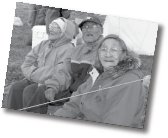
We must teach our children their mother tongue. We must teach them what they are and where they came from. We must teach them the values which have guided our society over the thousands of years. We must teach them our philosophies which go back beyond the memory of man. We must keep the embers burning from the fires which used to burn in our villages so that we may gather around them again. It is this spirit we must keep alive so that it may guide us again in a new life in a changed world. Who is responsible for keeping this spirit alive? It is clearly the older people. We must have the leadership which they once provided us. They must realize this responsibility and accept it. If the older people will remember, the young must listen.
When I talk about the future and try to describe what I would like for my children, some people sometimes say to me that I am only dreaming. What is wrong with dreaming? Sometimes dreams come true, if only one is determined enough. What kind of world would we live in if people did not have dreams? If people did not strive for what they believe in? We must have dreams. We must have ideals. We must fight for the things we believe in. We must believe in ourselves.2

An excerpt from Inuit Today, May 1977.
John Amagoalik was born at Inukjuak, Nunavik, and grew up in Resolute Bay. He has been a force in Inuit politics for many years and is often called ‘the father of Nunavut’.
The Inuit language has undergone changes like any other language but the major change has taken place since formal education was introduced. New words have been introduced and borrowed from English which has affected the structure of the language. Inuit who speak Inuktitut, Inuinnaqtun or Inuvialuktun know there is a real fear their language will die. What can this mean to Inuit? History in some parts of the Arctic or even in some families shows that the absence of the language in the early years of a child’s schooling deters, weakens or even loses the language for the individual. If this is so with all students, eventually it affects a generation of speakers.